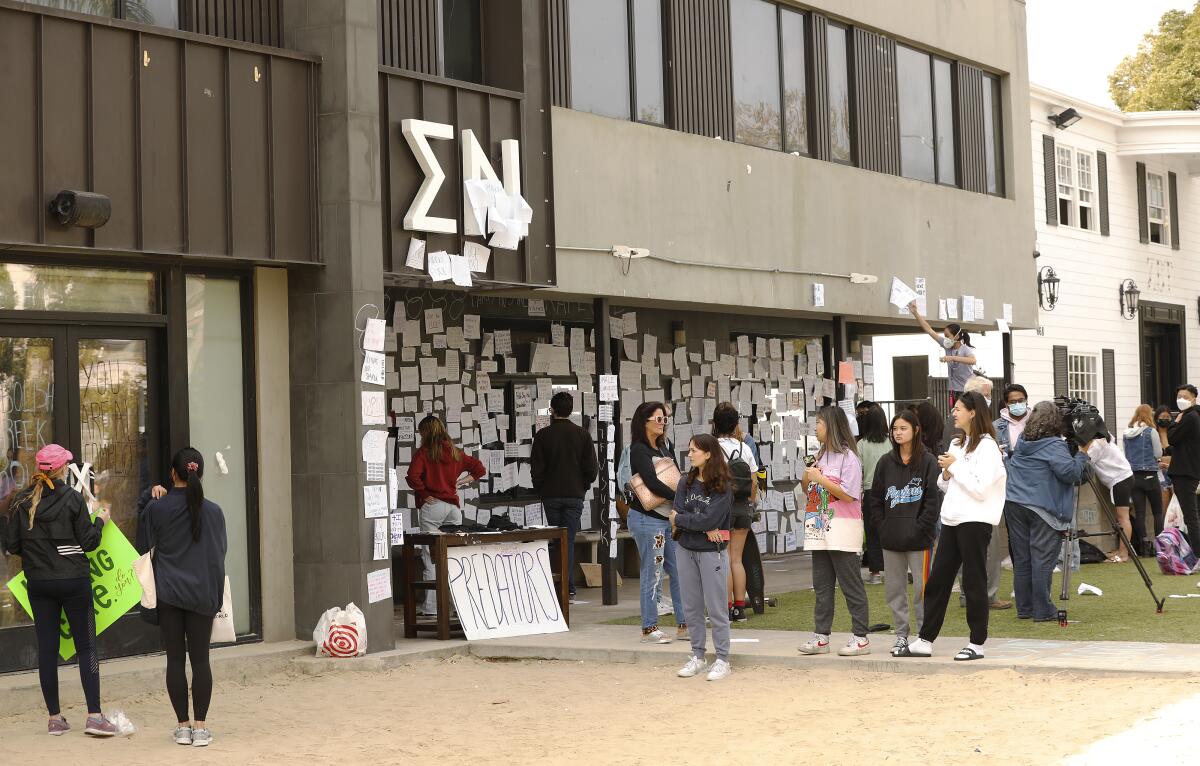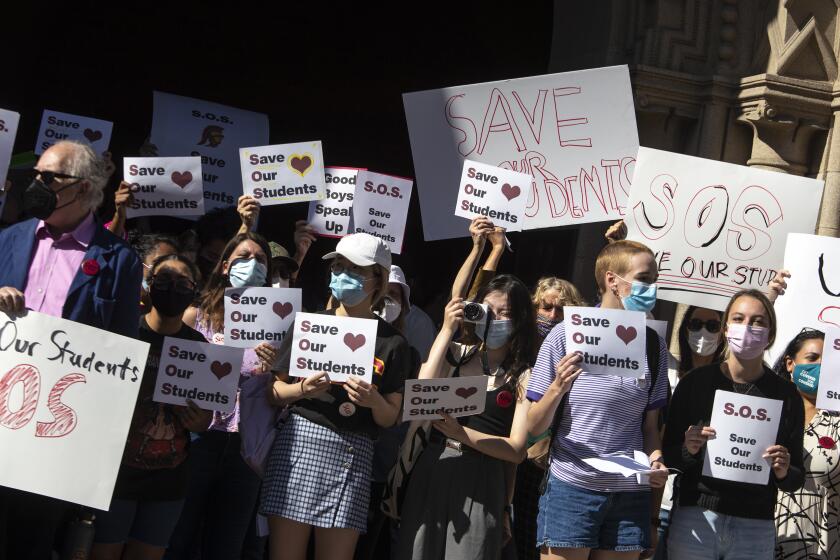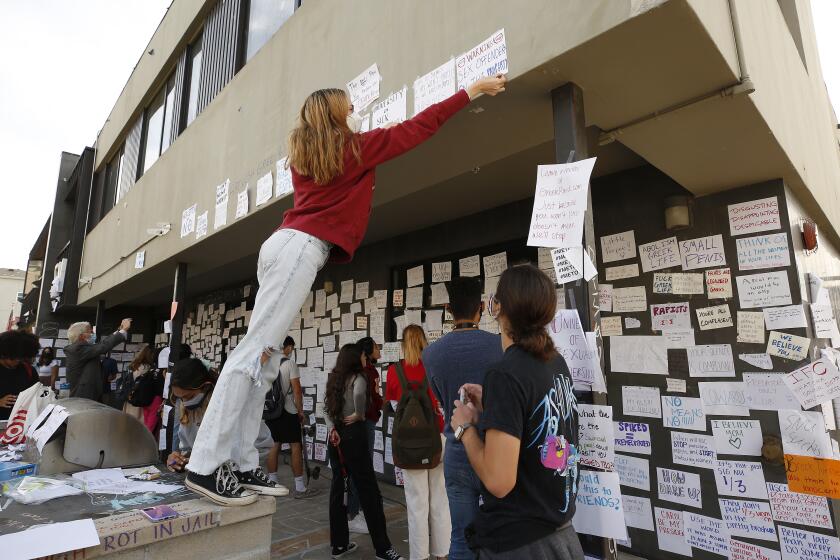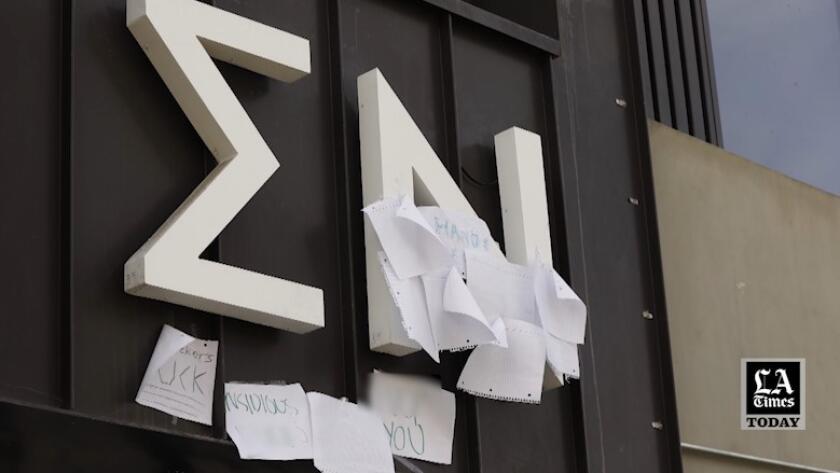USC fraternity parties can return, but with guards near bedrooms to prevent sexual assaults

Most USC fraternities will be open for parties in March if members abide by strict rules that include posting security guards at stairs or hallways leading to bedrooms, under new university polices enacted three months after allegations of sexual abuse and drugging at several houses roiled campus.
The requirements, issued ahead of spring recruitment “rush,” also include mandated risk and sexual violence prevention trainings for all fraternity members. The policies were drafted by a working group of about a dozen Greek life and student government leaders, safety experts, faculty and other student group representatives and approved by university officials. Provost Charles Zukoski called the partnership between the group and the university “critical” to the future of USC’s Greek life.
“About 4,000 of our students participate in fraternity and sorority life at USC, and many say that this is a central part of their USC experience,” Zukoski wrote this week. “Our community must work together to end sexual assault on our campuses. We appreciate everyone who brings forward concerns and reports sexual assault and other issues impacting safety and well-being, and we understand how difficult this can be.”
The policies were released as a Title IX investigation into allegations of sexual abuse at several USC fraternities remains underway and as students prepare to return to in-person instruction Monday after a remote start to the semester. Title IX prohibits sex discrimination in schools and educational programs that receive federal funding.
The university suspended the Sigma Nu chapter last fall following multiple allegations of drugging and sexual assault during parties at the chapter house. It also halted all fraternity house social gatherings in October after the reports surfaced. Sustained protests erupted on campus calling for Greek life reforms over what many said was a toxic culture of dangerous drinking, misogyny and racial insensitivity in fraternities.
Three additional fraternities that have also been suspended — Chi Phi Fraternity, Delta Tau Delta Fraternity, Phi Kappa Tau Fraternity — and will not be allowed to conduct any social activity, including new member recruitment. Kappa Sigma Fraternity is on modified suspension, which allows it to recruit members, but not hold social activities.
The USC furor signals a pivotal moment for the American college fraternity system, as more Greek members and student coalitions mount protests against an often toxic culture.
USC previously acknowledged a “troubling delay” in warning the campus community about sexual assault allegations. A confidential campus reporting service received five to seven disclosures of possible drugging and assault in late September and informed university authorities Sept. 30. But USC officials did not notify the community until Oct. 20 — four days after another female student reported a sexual assault at Sigma Nu.
The university received six reports of students alleging they had been drugged at Sigma Nu on Sept. 24, and one women alleged she had been sexually assaulted. Eight additional reports of sexual assault and seven reports of drugging taking place at various times, some allegedly involving other unnamed fraternities were also reported, according to crime logs from the USC Department of Public Safety.
Fraternity rush, which is required to be alcohol-free, starts virtually on Friday and moves to in-person recruitment on Monday when USC begins in-person classes after starting online amid the Omicron surge. Limited fraternity social activities will be allowed to resume on Feb. 3 and parties and other activities will go into effect on March 3, if fraternities adhere to the working group’s plan. Decisions about whether suspended chapters will be reinstated are pending the outcome of an Equity, Equal Opportunity and Title IX investigation.
The plan was implemented to address pressing issues identified by student leaders in the wake of the allegations, said Monique Allard, USC’s interim vice president of student affairs and co-lead of the working group.
The Sigma Nu fraternity suspension has ignited a fury of protests against toxic Greek culture
USC officials said they will be watching every step and are hiring a “compliance coordinator” to ensure all rules are followed. Weekly, an event review committee and chapter leaders will review “risk management plans, security implementation.” Security at events will be bolstered.
“This particular plan came about because this working group has been reviewing literature, best practices across the country and recommendations from our student community,” Allard said. “And one particular piece that speaks to security is being really intentional about keeping social gatherings in common spaces and public spaces.”
Natalia Parraz, a senior who helped organize a demonstration on fraternity row in October, said that she had hopes these early policies will be strengthened over time to include more preventative measures to stop sexual violence. She also noted that fraternities often hold unofficial gatherings.
“It’s important that they’re looking into this issue but it seems like the frats were put in time out,” Parraz, 22, said, wondering if the culture will really change.
Fraternities must prohibit guests from entering bedrooms during social events. They must post guards not only at entry points and gathering areas, but also “at stairs or hallways leading to bedrooms,” the policy document states. Security vendors will be hired in consultation with USC officials.
“The major conclusion of the Working Group is that creating a safe IFC community will require culture change that results in responsibility, accountability, and upholding of USC values,” the document states.
An Interfraternity Council task force, which will include mental health chairs, risk chairs and other chapter leadership, will also launch in March 2022.
Watch L.A. Times Today at 7 p.m. on Spectrum News 1 on Channel 1 or live stream on the Spectrum News App. Palos Verdes Peninsula and Orange County viewers can watch on Cox Systems on channel 99.
More to Read
Sign up for Essential California
The most important California stories and recommendations in your inbox every morning.
You may occasionally receive promotional content from the Los Angeles Times.














